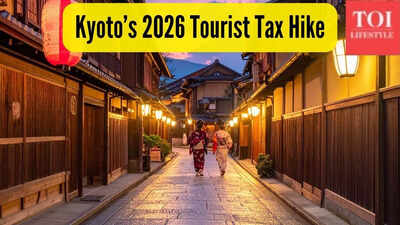 Not very good news coming from Kyoto, Japan! Starting 1st March, 2026, travellers to Kyoto will have to pay extra in the form of accommodation tax. This new change will make overnight stays noticeably more expensive. According to www.city.kyoto.lg.jp, the Japanese city has approved a revision to its stay tax. The change, formally approved by the Kyoto City Assembly and backed by Japan’s Ministry of Internal Affairs and Communications, aims to handle the two challenges: Over-tourism and Heritage conservation.But for Indian travellers planning a trip to Japan’s cultural capital, here’s everything you need to know for your next Kyoto trip, how much extra ‘yen’ you might have to pay, and ways to stay on budget. The revised rates Kyoto’s revised accommodation tax is tiered by room price and charged per person, per night. Room Price per Night (per person) New Tax (per person per night) Approx. in INRUp to ¥4,999¥200₹112¥5,000 – ¥19,999¥1,000₹560¥20,000 – ¥49,999¥4,000₹2,240¥50,000 – ¥99,999¥5,000₹2,800¥100,000 and above¥10,000₹5,600The change replaces a previous ¥1,000 cap and will apply to all stays beginning on or after 1 March 2026. Kyoto City Assembly has approved the ordinance and hotels in the city have already started posting notices to guests confirming the effective date of 1 March 2026 and warning that the revised tax applies even to reservations made before then if the stay starts on or after that date. In short: the change is official and hotels are already adjusting their billing. Kyoto: A heritage city of Japan
Not very good news coming from Kyoto, Japan! Starting 1st March, 2026, travellers to Kyoto will have to pay extra in the form of accommodation tax. This new change will make overnight stays noticeably more expensive. According to www.city.kyoto.lg.jp, the Japanese city has approved a revision to its stay tax. The change, formally approved by the Kyoto City Assembly and backed by Japan’s Ministry of Internal Affairs and Communications, aims to handle the two challenges: Over-tourism and Heritage conservation.But for Indian travellers planning a trip to Japan’s cultural capital, here’s everything you need to know for your next Kyoto trip, how much extra ‘yen’ you might have to pay, and ways to stay on budget. The revised rates Kyoto’s revised accommodation tax is tiered by room price and charged per person, per night. Room Price per Night (per person) New Tax (per person per night) Approx. in INRUp to ¥4,999¥200₹112¥5,000 – ¥19,999¥1,000₹560¥20,000 – ¥49,999¥4,000₹2,240¥50,000 – ¥99,999¥5,000₹2,800¥100,000 and above¥10,000₹5,600The change replaces a previous ¥1,000 cap and will apply to all stays beginning on or after 1 March 2026. Kyoto City Assembly has approved the ordinance and hotels in the city have already started posting notices to guests confirming the effective date of 1 March 2026 and warning that the revised tax applies even to reservations made before then if the stay starts on or after that date. In short: the change is official and hotels are already adjusting their billing. Kyoto: A heritage city of Japan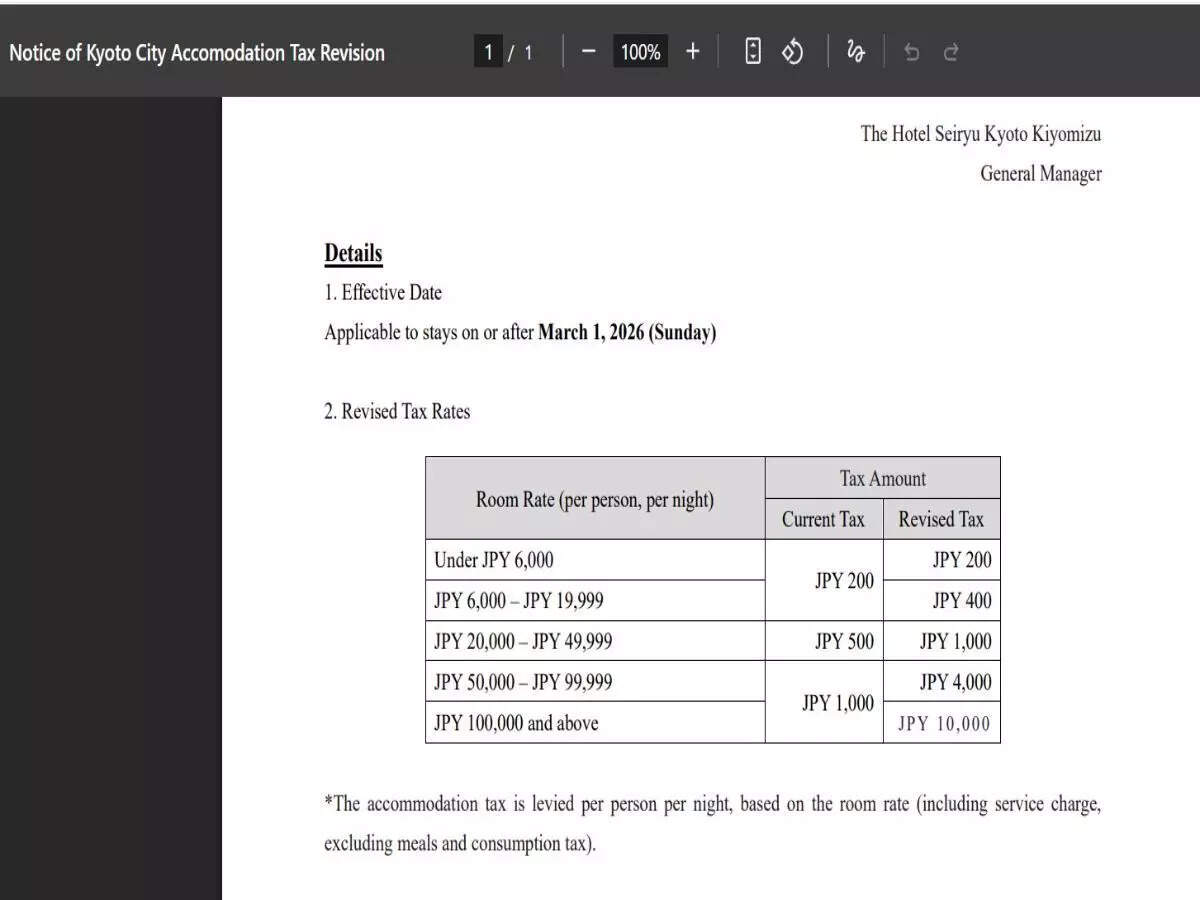 Kyoto has a deep cultural root. Post-pandemic, Japan recorded record visitor numbers in 2024 (roughly 36.9 million international arrivals), and tourism flows have concentrated on Tokyo–Kyoto–Osaka. Kyoto officials frame the tax as a user-pay mechanism to fund sustainable tourism measures Japan Tourism StatisticsHow will it affect touristsKyoto is a popular tourist destination and this tax might not stop travellers visiting the city entirely. This might tend to shift patterns (like less number of days, better use of budget options, or visits to less-crowded regions) rather than eliminating demand. Kyoto’s tax is highly progressive so budget travellers will be less affected than luxury travellers. The tax aims at short-term behaviour adjustments (book earlier, spread visits to off-peak days, stay outside central wards) are likely among savvy travellers. Let’s have a look at 5 must-visit attractions in Kyoto:
Kyoto has a deep cultural root. Post-pandemic, Japan recorded record visitor numbers in 2024 (roughly 36.9 million international arrivals), and tourism flows have concentrated on Tokyo–Kyoto–Osaka. Kyoto officials frame the tax as a user-pay mechanism to fund sustainable tourism measures Japan Tourism StatisticsHow will it affect touristsKyoto is a popular tourist destination and this tax might not stop travellers visiting the city entirely. This might tend to shift patterns (like less number of days, better use of budget options, or visits to less-crowded regions) rather than eliminating demand. Kyoto’s tax is highly progressive so budget travellers will be less affected than luxury travellers. The tax aims at short-term behaviour adjustments (book earlier, spread visits to off-peak days, stay outside central wards) are likely among savvy travellers. Let’s have a look at 5 must-visit attractions in Kyoto: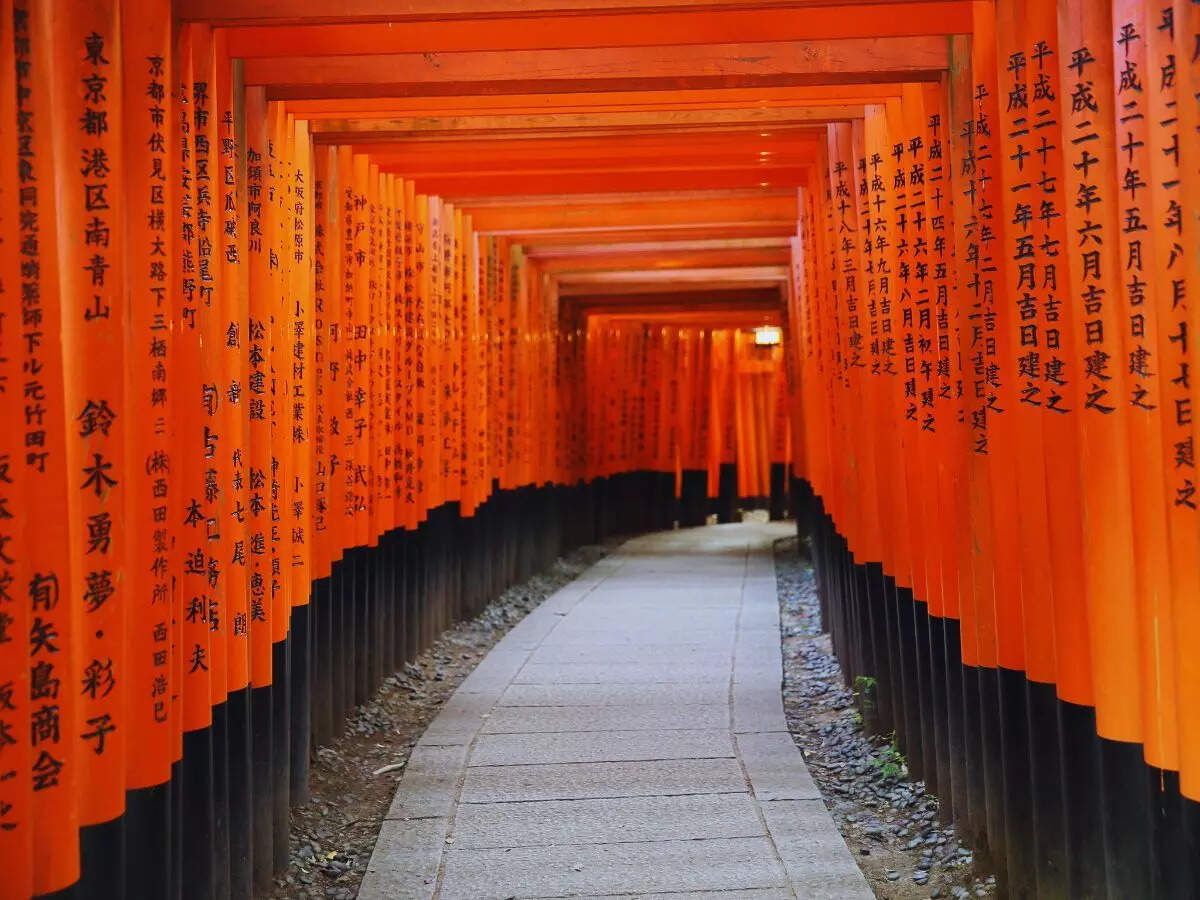 Fushimi Inari Taisha: Your trip to Kyoto would be incomplete without exploring the unique thousands of vermilion torii gates! These are iconic Kyoto attractions which line the paths of Fushimi Inari Taisha. This shrine is dedicated to Inari, the Shinto god of rice and prosperity. It’s a 4 km long scenic trail to the summit. The entire journey feels otherworldly!Kinkaku-ji (The Golden Pavilion): Kinkaku-ji is among Japan’s most photographed attractions. The place remains crowded with tourists wanting to get clicked with its top two floors covered entirely in gold leaf! The house was built as a retirement villa for a shogun. Autumn is considered the best time to explore the beauty of this place.
Fushimi Inari Taisha: Your trip to Kyoto would be incomplete without exploring the unique thousands of vermilion torii gates! These are iconic Kyoto attractions which line the paths of Fushimi Inari Taisha. This shrine is dedicated to Inari, the Shinto god of rice and prosperity. It’s a 4 km long scenic trail to the summit. The entire journey feels otherworldly!Kinkaku-ji (The Golden Pavilion): Kinkaku-ji is among Japan’s most photographed attractions. The place remains crowded with tourists wanting to get clicked with its top two floors covered entirely in gold leaf! The house was built as a retirement villa for a shogun. Autumn is considered the best time to explore the beauty of this place.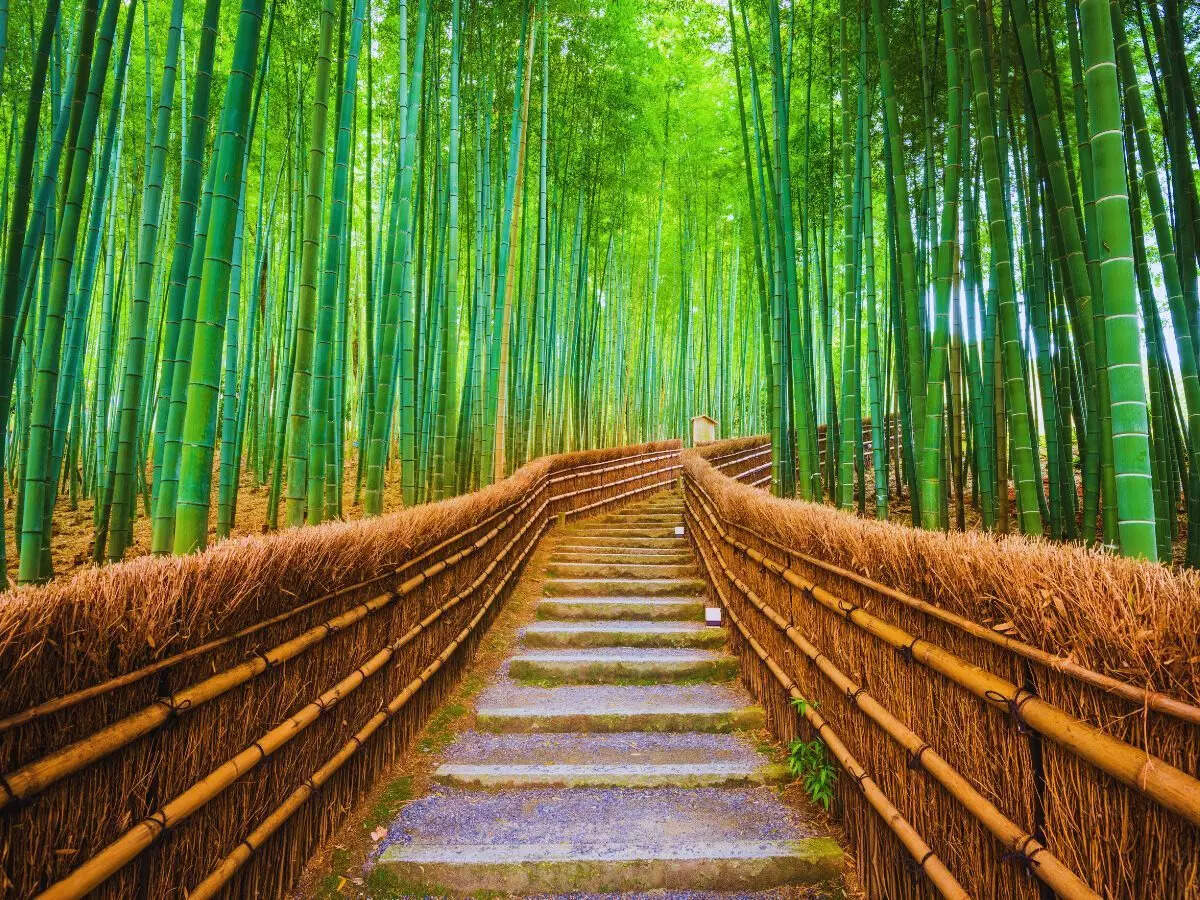 Arashiyama Bamboo Grove: It’s like stepping into another world altogether! Arashiyama is otherworldly and beautiful beyond imagination. The towering bamboo stalks sway gently in the wind, creating a surreal, whispering soundscape. The nearby Tenryu-ji Temple and the Togetsukyo Bridge add historical and scenic charm, making this area perfect for an early morning stroll or cycling tour.Gion District: It’s a gorgeous place in Kyoto where one can enjoy traditional entertainment, like cobblestone streets, paper lanterns, and wooden machiya. It’s one of the few places where you might spot a geisha or maiko walking down the lanes.
Arashiyama Bamboo Grove: It’s like stepping into another world altogether! Arashiyama is otherworldly and beautiful beyond imagination. The towering bamboo stalks sway gently in the wind, creating a surreal, whispering soundscape. The nearby Tenryu-ji Temple and the Togetsukyo Bridge add historical and scenic charm, making this area perfect for an early morning stroll or cycling tour.Gion District: It’s a gorgeous place in Kyoto where one can enjoy traditional entertainment, like cobblestone streets, paper lanterns, and wooden machiya. It’s one of the few places where you might spot a geisha or maiko walking down the lanes.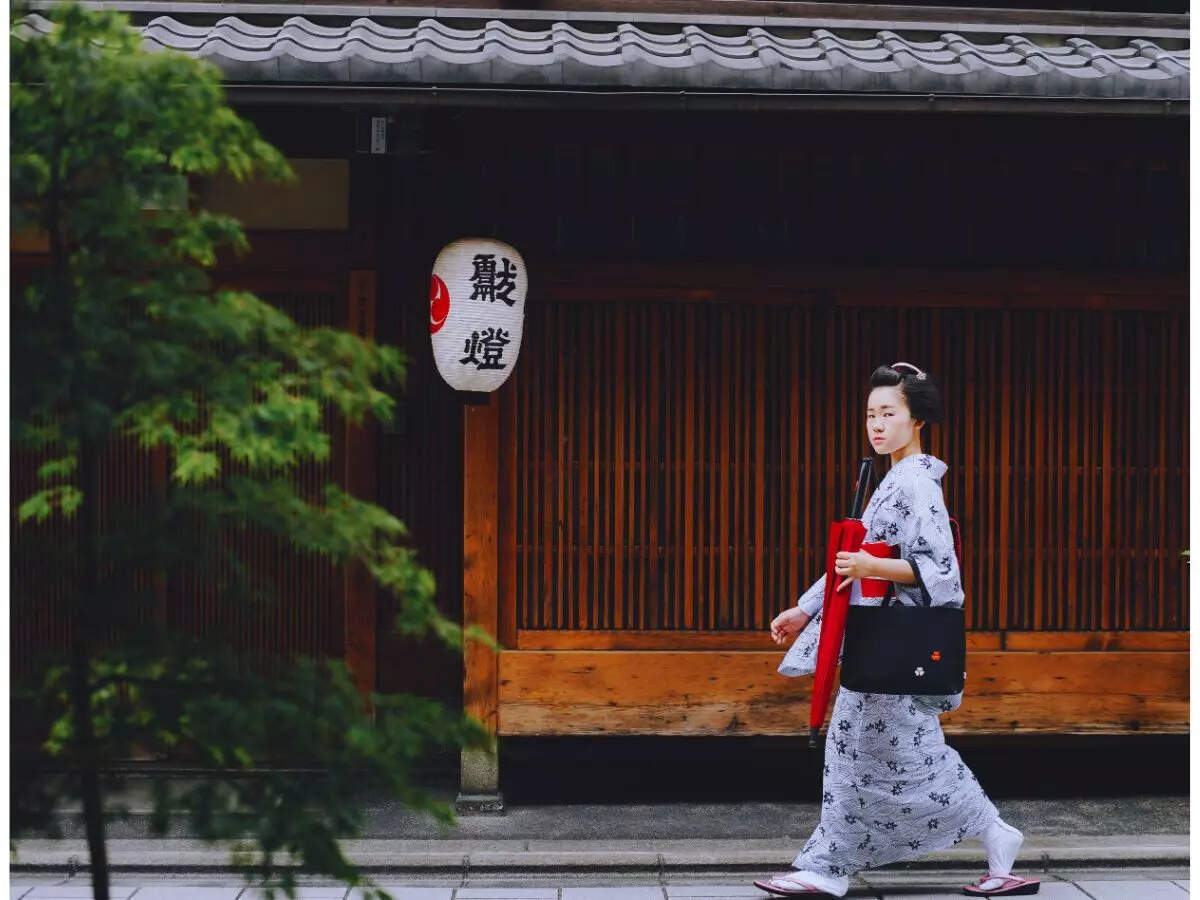 Kiyomizu-dera Temple: Set atop a hill, overlooking the city, Kiyomizu-dera is a UNESCO World Heritage Site noted for its wooden stage that juts over the valley. The temple offers spectacular cherry blossom and autumn foliage views. Don’t forget to sip from the Otowa Waterfall, believed to bring luck and longevity.So, next time you visit Kyoto, do not forget to enjoy these beautiful sights.
Kiyomizu-dera Temple: Set atop a hill, overlooking the city, Kiyomizu-dera is a UNESCO World Heritage Site noted for its wooden stage that juts over the valley. The temple offers spectacular cherry blossom and autumn foliage views. Don’t forget to sip from the Otowa Waterfall, believed to bring luck and longevity.So, next time you visit Kyoto, do not forget to enjoy these beautiful sights.

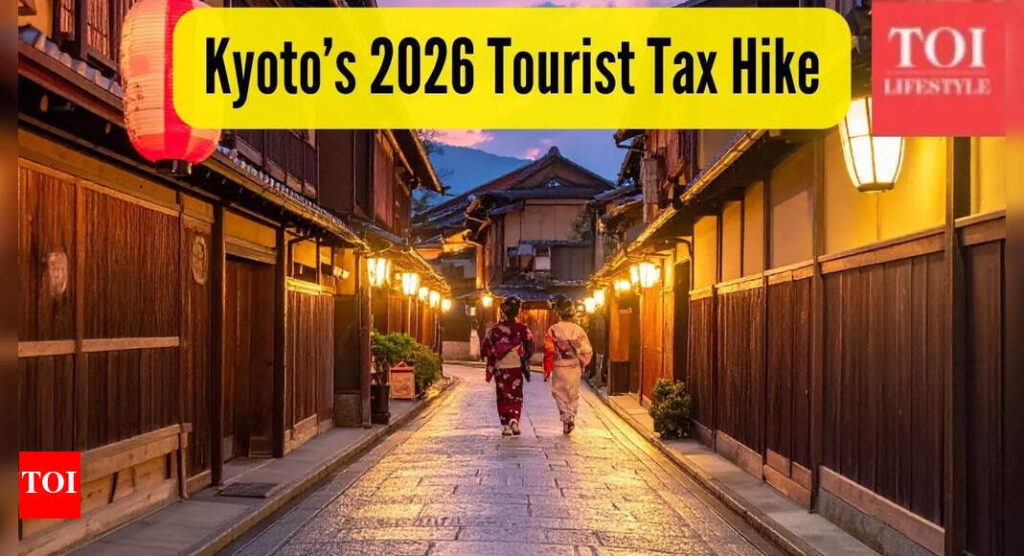
AloJapan.com